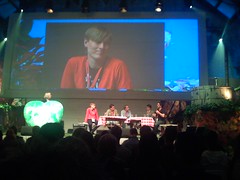PICNIC07: Panel, \"Up Close and Personal: Share your Life\"
PICNIC07: Panel, "Up Close and Personal: Share your Life"
First up, Jyri of Jaiku with his personal take; references Brad Fitzpatrick on "the Social Graph" (posh name for social software, it seems). People are connected by objects, and we need to represent these objects somehow: e.g. delicious turns bookmarks into social objects, used to connect me to other people who've bookmarked the same places. Flickr turned photos into social objects, Youtube videos. We're going into activity streams that show what your friends are doing now with objects. Subject-verb-object. Social software promotes what I should be aware of around myself, in a virtual social space. Will we see a "facerank" algorithm analogous to "pagerank", and delivering similar benefits.
 Biz Stone on how Twitter started: Jack and he were working together, wanted to tie SMS and the web together and were intrigued about MSN status messages. Built a prototype in a couple of weeks, which was really fun to use. Twitter's being used for social activism: "censorship is the sincerest form of flattery". Example of an activist leaving micro-updates: dead easy, and even the lack of updates is in itself an indication of useful information.
Biz Stone on how Twitter started: Jack and he were working together, wanted to tie SMS and the web together and were intrigued about MSN status messages. Built a prototype in a couple of weeks, which was really fun to use. Twitter's being used for social activism: "censorship is the sincerest form of flattery". Example of an activist leaving micro-updates: dead easy, and even the lack of updates is in itself an indication of useful information.
Matt Biddulph of Dopplr: Dopplr users have so far travelled 89 million miles. There's serendipity in travel. (Dopplr==planned serendipity?). This gives some access to the things high-end travellers have: e.g. help from others.
Raymond Spanjard of HYves talks about how it put him in touch with transexuals seeking wigs :)
Jyri: "When your friends know what you're up to, you get magical powers".
Raymond: "the future of social networks is mobile".
Felix Petersen, Plazes: most people don't use social networks to hook up with strangers, but to keep track of existing friends in different contexts. There'll always be a need for one-to-one communication, but discovery and finding out what your best option is for social interaction precedes that.
Biz: putting APIs atop of SMS and the like is empowering for the third world.
Talking about how each panelists network interoperates with other networks: "why are you witholding happiness from each of us?"
Jyri: lots of services don't share social networks, because we haven't had the means to do it. It's not due to lack of will; we're getting to a phase of Web 2.0 where we're coming up with useful standards: OpenID, XMPP to push out information (instead of pulling RSS). Jaiku lets you pull your updates from other services by RSS.
Biz: we created an API early on. We see 20x traffic via API than via web site.
Raymond: blah blah integrate flickr photos blah.
Felix: flannels, I feel :)
Matt: Dopplr are specialist, some people say that it feels like a feature of a larger system. We say "yes, the Internet". Dopplr works best with other systems: "what did I twitter from SF"? Dopplr should appear amongst other services, you should never need to go to the site. We've launched Facebook, import social graph from twitter, and the ability to dump data out from the API, not just get it in. Dopplr is fun and interesting (and has no memory until 1.0), but may get mixed with other sites.
Moderator invites the panel to ask each other difficult questions.
Jyri: Biz, will Twitter ever support photos?
Biz: Not sure, we're not against the idea but love the simple 140-char format. Possibly but there's no timetable.
Matt: Jyri: do you regret starting out making mobile clients?
Jyri: no. Platform plays are easier as it avoids the problem of distribution. Will mobile be ready for rich applications, or will we be stuck with SMS? We'll probably have pockets of more advanced mobile devices (e.g. Nokias), operators have cut data rates, etc. But for global reach you're stuck with lowest common denominator like Twitter.
Jyri, Matt: how does doing a travel site square with the ecological impact of it?
Matt: serendipity allows people to optimise their trips. One problem with carbon offsetting programs out there at the moment is that they don't know where you've been - we do.
Moderator: one thing that struck we watching Twittervision is that it gives you the sense of everyone experiencing the same range of mundane and profound experiences and emotions.